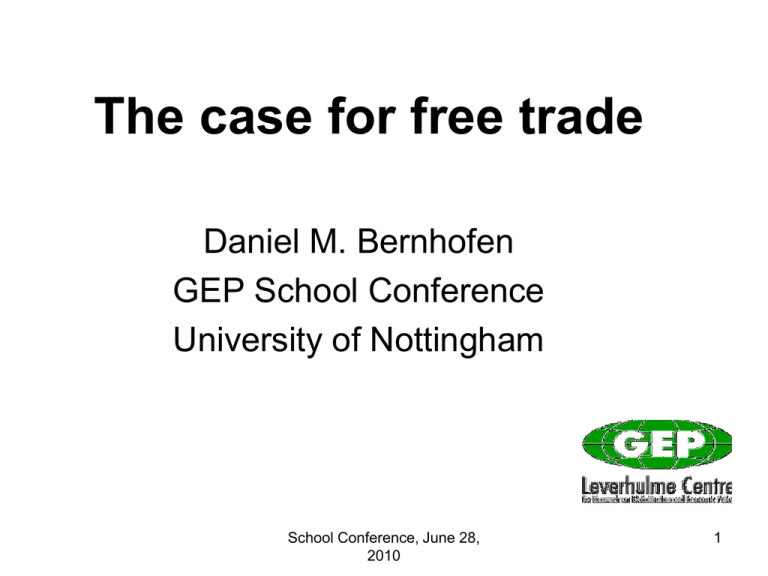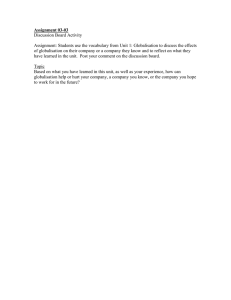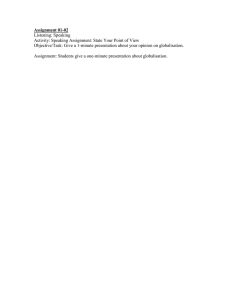The Case for Free Trade
advertisement

The case for free trade Daniel M. Bernhofen GEP School Conference University of Nottingham School Conference, June 28, 2010 1 Motivation • Q: What trade economists do? A: Ask and try to answer questions about the global economy. Key questions in the field of international economics: 1) Why do countries trade? 2) What has caused the increase in world trade? 3) What are the benefits/costs from international trade? 4) What are the recommendations for government policy? School Conference, June 28, 2010 2 Organization • Facts about international trade. • General economic arguments for free trade. • Look deeper into one theoretical framework: “the enhanced opportunity argument for free trade”. • How is free trade sustainable ? School Conference, June 28, 2010 3 Facts about international trade: GDP: Sum of the market value of all goods and services produced in the economy in a given time period. Trade: (Imports+Exports))/2 Data Source: World Development indicator, (World Bank, 2005), School Conference, June 28, 2010 4 School Conference, June 28, 2010 5 Where does the Barbie Doll come from ? School Conference, June 28, 2010 6 Arguments for free trade • Enhancement of opportunities - Opportunity to make the best from your economic resources (endowments and technologies). Opportunity of having access to goods and technologies that the economy could not produce on its own. • Increase in competition - Foreign competition can reduce firms’ market power and provide an incentive for firms to innovate. Innovation is the key driver of economic growth. • Peace argument (non-economic) - Europe and “the German problem”. School Conference, June 28, 2010 7 Enhancement of opportunities Model: • assume two goods: agriculture and manufacture • assume two worlds: with and without trade: • Production choices are constrained by - countries’ endowments: labour, capital stock, land. - available technology. => Concept of a production opportunity set which illustrates the trade-offs a society faces. School Conference, June 28, 2010 8 Economy’s opportunity set Agriculture Output Opportunity set is constrained by technology and endowments. C A B Manufacturing Output School Conference, June 28, 2010 9 Enhanced opportunities with trade Enhanced opportunity set Agriculture Output D International trade line Import B Export Manufacturing Output School Conference, June 28, 2010 10 Trade acts like economic growth Agriculture Output D Point D could also be attained through internal growth Manufacturing Output School Conference, June 28, 2010 11 New goods Mobile phones Example: Sub-Saharan economy which is not able to produce mobile phones Opportunity set is constrained to agricultural goods Maximum amount of output Agriculture Output, School Conference, June 28, 2010 12 International trade provides access to new goods Mobile phones Sub-Saharan economy is able to obtain new goods International trade line D Import Export School Conference, June 28, 2010 Agriculture Output, 13 Two waves of globalisation • First wave of globalisation:1870-1914. • World War I: 1914-1918. • Interwar Period and the Great Depression of the 1930s. • World War II: 1939-1945. • Second wave of globalisation:1945present. School Conference, June 28, 2010 14 School Conference, June 28, 2010 15 What caused the growth of world trade? • Government policies – WTO (World Trade Organisation) • Different rounds of trade negotiations • Multi-lateral principles (non-discrimination, treat everybody like a most favored nation). – Regional integration. • EU, North-American Free Trade Association (NAFTA) • Improved transportation technology – Reduction of shipping costs (The container) – Improved information technology (PC, internet). – School Conference, June 28, 2010 16 Recent concern: The collapse in world trade (October-Dec. 2008) School Conference, June 28, 2010 17 The collapse in world trade (continued) • Two main causes: (i)Breakdown of international supply chains (a la Barbie doll) (ii)Global reduction in consumer demand. Concern about protectionism: - Prevent the lessons from the past where governments imposed trade barriers. - So far, existing national and international institutions have prevented this. School Conference, June 28, 2010 18



